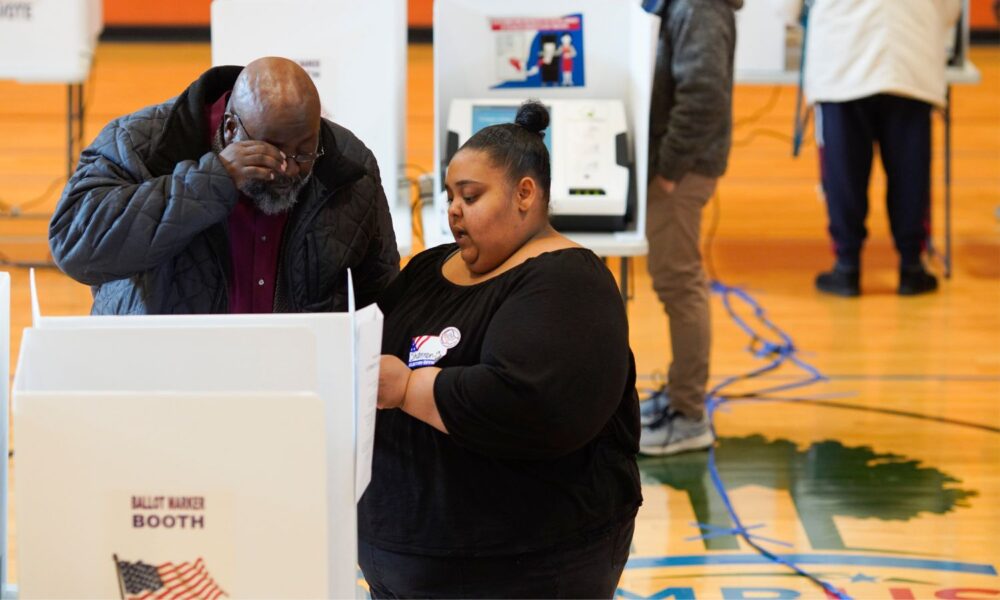Around the country, election officials and administrators—the people responsible for overseeing, conducting, and ensuring accessible and accurate elections—are leaving their posts. High turnover among election officials can diminish institutional knowledge and negatively affect voters. As this recent New York Times article illustrates, disinformation, harassment, and a lack of resources are at the heart of why election officials are being driven from the profession. The hard-working civil servants who take on the task of administering elections are vital to democracy and under intense pressure. We need to support them so they can do their job.
Officials are leaving their posts
Turnover is natural in any position, but the rate at which election officials leave their positions was higher in 2022 than any other point in the last twenty years, at 39% (up from 28% in 2004). Unsurprisingly, the turnover spike started in 2020. A recent Brennan Center for Justice survey found that 21% of local election officials either started working in their position after the 2020 election or say they are “very” or “somewhat unlikely” to stay in their positions for the 2024 election.
The Institute for Responsive Government found that among the states they studied from 2019 to 2023, turnover was highest in Missouri, Arizona, New Mexico, Oregon, Utah, Wyoming, Kentucky, and Nevada, while the Center for Bipartisan Policy’s nationwide study found that states with the highest turnover rates from 2018 to 2022 were Indiana, Arizona, California, and Pennsylvania, with rates ranging from 64.1% to 56.7%.
Both reports argue that, despite high turnover, most incoming elections officials have prior experience in election administration. Despite this, top election officials in several states have drawn attention to the exodus of many election officials in their jurisdictions. Al Schmidt, Secretary of the Commonwealth of Pennsylvania, and North Carolina’s State Board of Elections Executive Director Karen Brinson Bell have both spoken out about their concerns regarding the number of election officials leaving the profession. In Pennsylvania, 70 senior directors or their direct deputies have recently left their positions. In his statement raising concerns about turnover in Pennsylvania, Secretary Al Schmidt directly cited his personal experience as the subject of harassment and threats.
What’s causing the high turnover of election officials?
While we shouldn’t necessarily worry about having unqualified election officials, we should try to understand and address why we’re seeing rising turnover. One reason is that election officials are saddled with increasingly complex work, are given inadequate resources for that work, and receive “chronically low pay” to do it.
When surveyed by the Brennan Center for Justice in April 2023, a whopping 74% of election officials said they needed more funding. Both state governments and the federal government are failing to provide sufficient funding, leaving elections susceptible to administrative errors, poll worker shortages, and cyberattacks. In North Carolina, a lack of funding forced officials to eliminate one cybersecurity position and reduce the number of employees managing election data from six workers to one full-time and one part-time employee.
But perhaps the most pressing reason officials might be jumping ship is because of the escalating climate of hostility and threats they face.
In 2022, 25% of local election officials—especially those in larger jurisdictions—said they’d had been abused, harassed, or threatened in the last two years. In 2024, another study found that 30% of surveyed officials reported having faced personal abuse, harassment, or threats. Since the summer of 2021, the Federal Bureau of Investigation (FBI) has received over 1,000 tips concerning threats made against election workers; they’ve officially investigated a little under a dozen. The FBI noted these threats were most prevalent in a handful of states, including Michigan, Wisconsin, and Pennsylvania.
In the summer of 2021, the Department of Justice created the Election Threats Task Force and has charged 20 people for making threats against election officials, resulting in 13 convictions. An Ohio man was recently sentenced to two and a half years in prison for his threats against Arizona’s former Secretary of State Katie Hobbs. In Michigan, a man was charged for saying that the director of elections in Oakland County should be hanged for treason. In July, an Indiana man was sentenced to 14 months in prison for sending death threats to an election administrator in Michigan after the 2020 election. And, as previously mentioned, Pennsylvania Secretary of State Al Schmidt cited the rise of death threats against officials and recounted his first-hand experience of being threatened during the 2020 presidential election.
Most of these threats target women who constitute 80% of the election workforce in the country. Studies have also found that threats made against women in election administration tend to use sexual or misogynistic language, gender stereotypes, and threats of sexual violence. In 2022, Emily Cook was the deputy director of elections in Luzerne County, Pennsylvania. After a swath of administrative problems in the November 2022 elections in the county, Cook, and her colleagues, were threatened. In the weeks before the April presidential primary election, Cook was named the acting election director after the former director resigned just a year into the role.
When Tina Barton, a former clerk from Michigan, was called out at a Republican conference in 2020 after her election office made a minor administrative error on election night (a mistake that was promptly corrected), she was shocked. A Republican, she watched as members of President Trump’s campaign team tweeted about her by name, accusing her of “giving” Republican votes to Democrats. Since 2020, Barton has left her position as a city clerk but is now traveling around the country helping election administrators prepare for various election scenarios, including how to respond to the kind of threatening voicemail she personally received a few days after she gained national attention. The man who left the message eventually pleaded guilty to threatening to kill Barton and was sentenced to 14 months in prison.
Ahead of the 2024 election, the Republican National Committee announced “Protect the Vote”, a plan to recruit 100,000 poll workers and election monitors to volunteer at polling places across 7 swing states. Critics worry that these volunteers, whose purported intention is to monitor cases of voter fraud, could intimidate voters and administrators. Moreover, there are concerns that these poll workers and monitors will become aggressive, leading to instances of harassment and interference.
The attempted assassination of former president and current Republican nominee Donald Trump earlier this summer is causing some election officials, like Towanna Dixon in Moore County, North Carolina, to worry about the potential violence her staff and poll workers might face in November, and that the specter of this violence may cause some poll workers to quit.
How do we protect election officials?
The good news is there are steps the federal government and state governments can take to help protect the people we rely on to run our elections and decrease turnover.
First, to help election workers effectively and safely do their jobs, we need ways to effectively combat election lies and conspiracy theories made on and off social media.
Election officials agree that the spread of disinformation makes their jobs more dangerous. Misinformation and disinformation can motivate people to harass, abuse, and threaten election workers. With a chaotic campaign season, an attempted assassination, and last-minute candidate changes, conspiracy theories are spreading more than ever. Challenging disinformation is vital, including encouraging social media companies to offer comprehensive and clear ways to identify sources of disinformation.
To that end, UCS is working with election officials, administrators, and others involved in elections on our Election Science Task Force to respond to disinformation as it happens in the coming months.
Second, every state as well as the federal government should adopt laws protecting election officials, administrators, staff, and poll workers from threats and securing their personal information. Since 2020, 18 states have enacted laws focused on protecting election workers, and more states should follow. Moreover, state governments and the federal government must rigorously investigate instances of abuse, harassment, and threats against election workers and charge those responsible.
After a third-floor window at the Cuyahoga County Board of Election’s building in Ohio was shot at in June 2024, state legislators proposed a bill that would protect election administrators by preventing the disclosure of public records relating to where officials or their families live.
Legislators must also recognize the importance of specifically addressing threats made against women. The Brookings Institute point to a recent California law that expanded confidentiality protections for survivors of domestic violence to also cover election officials. Brookings also argues that The Violence Against Women Act of 1994 (VAWA) should be used to protect female election workers.
Relatedly, states can ban firearms at polling places. During a time of increasing worry of political violence, especially after the shooting at a Trump rally in July, several states have banned firearms at polling places. Nine of the 21 states that have laws prohibiting firearms at voting locations passed these statutes in the last two years. In fact, a bill proposing such a ban was introduced in Pennsylvania’s legislature earlier this year.
Finally, we can pay election officials and their staff competitive salaries as well as allocate more funding to election offices. Funding should include money specifically for election security, so officials don’t have to “choose between improvements for voters and their own safety.” For example, in 2022, the Brennan Center for Justice estimated the relative cost of several security measures such as bulletproofing election offices and installing panic alarm systems.
Election officials are key to a healthier democracy
To have a healthy democracy, we need experienced election administrators who can safely conduct free and fair elections. As disinformation, violence, harassment, and inadequate resources drive these officials to leave their positions, the risk of poorly run and inequitable elections grows. This trend is more than an administrative inconvenience—it is a fundamental challenge to our democracy. By implementing the steps detailed above, we can begin to make the necessary changes required to address this challenge.

